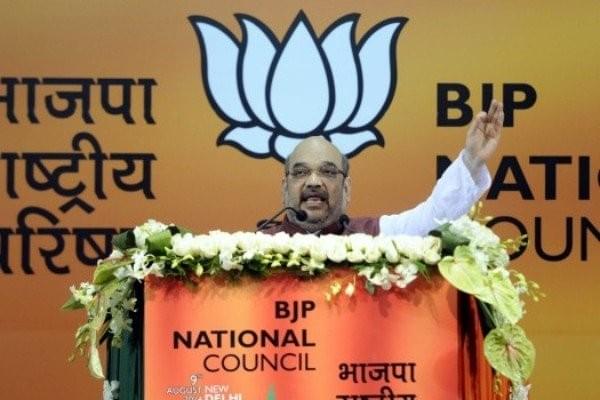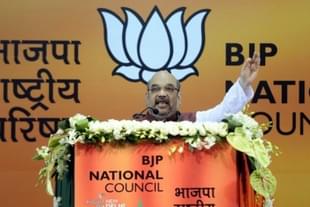Politics
After Exiting J&K Misadventure In Nick Of Time, BJP Needs To Ask Itself: Who Does It Represent?
R Jagannathan
Jun 20, 2018, 12:16 PM | Updated 12:16 PM IST
Save & read from anywhere!
Bookmark stories for easy access on any device or the Swarajya app.


About the only thing the BJP got right in its Jammu and Kashmir (J&K) policy was the timing of its exit from the coalition government. Consider where it would have been if, instead of pulling the plug on Mehbooba Mufti’s PDP yesterday (19 June), the latter had taken the initiative to drop all BJP ministers and forced them to quit saying they were not doing their jobs. The BJP would have been left with no face, no story to tell its core base.
The problem for the BJP is essentially a simple one: if you make compromises to gain power without understanding who you are or what you stood for, you have to be able to show what you gained from the compromise. To be a junior partner in the PDP-led coalition, the BJP gave up all its demands: abolition of article 370, full integration of the state with the rest of India, and abandonment of article 35A, which empowers the state legislature to decide who a permanent resident is, who can be given special privileges.
More than article 370, which merely gives more autonomy to J&K, it is article 35 A that is the key villain. It was slyly included in the constitution without parliament passing it, providing the state the basis for separatist thinking. Article 370 can be fixed once all Indian states are given more powers to manage their affairs, but article 35A – which is being heard in the Supreme Court – must go. As long as it stays, it provides the intellectual basis for all Indian states to discriminate against migrants and people from outside the state. The basis of Indian nationhood is equal rights for all citizens in any part of India. This is a point even so-called “constitutional liberals” never emphasise. Once this clause goes, Indians can move and settle in J&K and vice-versa, allowing greater emotional integration.
The BJP must target article 35A even more than article 370.
But the larger question is for the BJP to ask itself what it won’t do for acquiring power: if it will do anything, including sell its grandmother and core principles, for power, it will not only alienate its core voter, but cease to be any different from the Congress or any other bogus secular party. It might as well merge with the Congress, or take the latter over and appoint Sonia Gandhi as its titular head.
In J&K, for example, the BJP did not ask itself a fundamental question: what did it gain (for the country or itself) by sacrificing its demand – even if temporarily – for abandoning article 370? At the very least, it should have got Mufti to toe its line on national security and offer a commitment to campaign for J&K being an integral part of India so that alienated youths could be brought back to the mainstream. It should also have taken a strong stand against jihadi Islamism, but Mufti actually went the other way in asking India repeatedly to talk to Pakistan, when that country is the source of our problems in the Valley. Pakistan’s generals are committed to India’s destruction, with Kashmir being the first on the agenda.
While there is no harm talking to Pakistan or alienated Kashmiris without conceding first principles, the point is if Mufti was never going to do her bit to convince her people to drop the gun (or stones, for that matter), the partnership was never going to work. Clearly, Mufti did not bring any strength to the table where the BJP could justify its dilution of stand on article 370. Article 35A, of course, is unconstitutional, and must be scrapped by the courts.
The three-and-a-half years misadventure in J&K brings the BJP back to facing this basic question: what is the party’s self-definition?
The answer must be clearly this: it is a party for Indic peoples and cultures, which includes Hindus, Jains, Sikhs, Buddhists, and many local tribal cultures resident within the territory of India.
So, what happens to the Muslims and Christians who exist is large numbers in various parts of India?
Answer: the BJP should not make the mistake of claiming to represent them. Instead, it should allow them to speak for themselves, and enter into coalitions with parties representing them on the basis of an understanding of what it can do for them. It is not right for the BJP to claim to represent Muslims and Christians, for this would be a wrong claim. In fact, this was a wrong claim even for the Congress to make, for it was merely running a protection racket for the minorities and doing little for them.
A genuine statement that the BJP does not represent Muslims and Christians – except those who accept cultural nationalism in the way it defines it – means the BJP would be free to defend Indic interests, while working out deals for power-sharing on the basis of specific agreements with those who represent non-Indic peoples or religious groups. If the BJP claims it represents everybody, it will end up representing nobody.
This is what happened in J&K, where it even failed to defend Jammu’s and Ladakh’s interests, while sacrificing its overall stand on articles 370 and 35A. In J&K, its primary duty was to speak up for Jammu & Ladakh and wrest concessions from Mufti, but it hardly did so.
This is the only way forward: the BJP must define its constituency and let Muslims and Christians bargain with it for things that are of interest to them. In fact, this should be the rule for every party. Define who you represent.
Sabka saath, sabka vikas can be a government slogan, not for a party which claims a Hindu constituency.
Jagannathan is former Editorial Director, Swarajya. He tweets at @TheJaggi.




